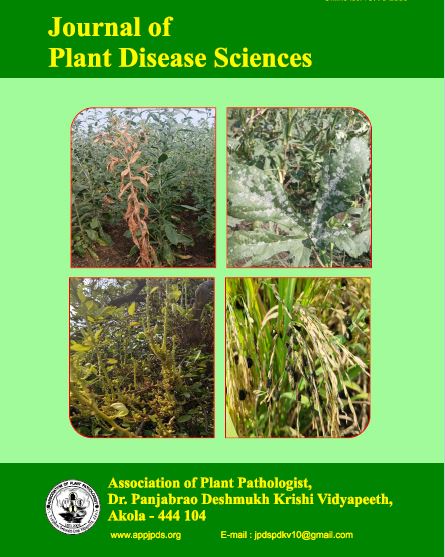Evaluation of Plant Extracts Against Xanthomonas Citri Causing Citrus Canker
DOI:
https://doi.org/10.48165/jpds.2023.1801.12Keywords:
Antibacterial extracts, Citrus cankar, Inhibition, Xanthomonas citri subsp. citri.Abstract
Solvents, including acetone, chloroform, distilled water, ethanol, and methanol, were used to test the antibacterial capabilities of two plants, Psoralea corylifolia and Emblica officinalis, against Xanthomonas citri subsp. citri, the major cause of citrus canker disease. Psoralea corylifolia seed extract yielded the highest extraction yield (14.50%) in methanol and the lowest in dichloromethane (9.75%), whereas Emblica officinalis extract yielded the highest extraction yield (15.75%) in methanol and the lowest (0.65%) in petroleumether solvent. Psoralea corylifolia and Emblicaofficinalis methanol extracts were reported to have potential antibacterial action against Xanthomonas citri. In vitro screening of eight plant-concentration interactions revealed various levels of toxicity to the bacterium, indicated as mean zone of inhibition of bacterial growth. At all concentrations examined, it was found that E. officinalis plant extract inhibited the test bacterium the most when compared to P. corylifolia plantextract.
References
Anbuselvi, S., and M. Jha, 2015: Phytochemical and antimicrobial activity of Emblica officinalis seed extract. World J. of Pharmaceutical Res., 4(8): 1336-1341.
Bhure, S.S., S. B. Bramhankar, K. D. Thakur, A. A. Labhasetwar, S. S. Isokar, G. T. Dinkwar, 2019: In vitro bio efficacy of different antibiotics, bioagent and botanical against (Xanthomonas axonopodis pv. citri) causing bacterial canker of acid lime. Int. J. Chem. Stud., 7(1):1789- 1782.
Borate, A., A. Khambhapati, M. Udgire, D. Paul and S. Mathur, 2014: Preliminary phyto chemical studies and evaluation of antibacterial activity of Psoralea corylifolia seed extract. American. J. Phytomed. Clin. Ther., 2(1): 95-101.
Das, A.K., 2003: Citrus canker: A review. J. Appl. Hort., 5(1): 52-60.
Dhawan, D., and J. Gupta, 2017: Comparison of different solvents for phytochemical extraction potential from Daturametel plant leaves. Int. J. Bio. Chem., 11(1):17-22.
Felhi, S., A. Daoud, H. Hajlaoui, K. Mnafgui, N. Gharsallah, and A. Kadri, 2017: Solvent extraction effects on phytochemical constituents profiles, antioxidant and antimicrobial activities and functional group analysis of Ecballium elaterium seeds and peels fruits. J. Food Sci. Technol., 37, 483–492. doi: 10.1590/1678-457x.23516
Gadhe, S. K., N. S. Dale, R. B. Umbarkar, G. A. Khandelwal, 2016: In vitro inhibitory activity of crude extracts of plant against citrus canker caused by Xanthomonas axonopodis pv. citri. Int. J Curr. Res., 8:533-537.
Kanthimathi, M., and R. Soranam, 2013Journal of Chemical Studies, 8(2): 1878-1882.
Kumar, P., S. Sen, M. Shakya, and T.S. Easwari, 2015: Comparative phytochemical investigation and biological evaluation of Psoralea corylifolia. J. Chem. Pharm. Res., 7(6):217-225.

